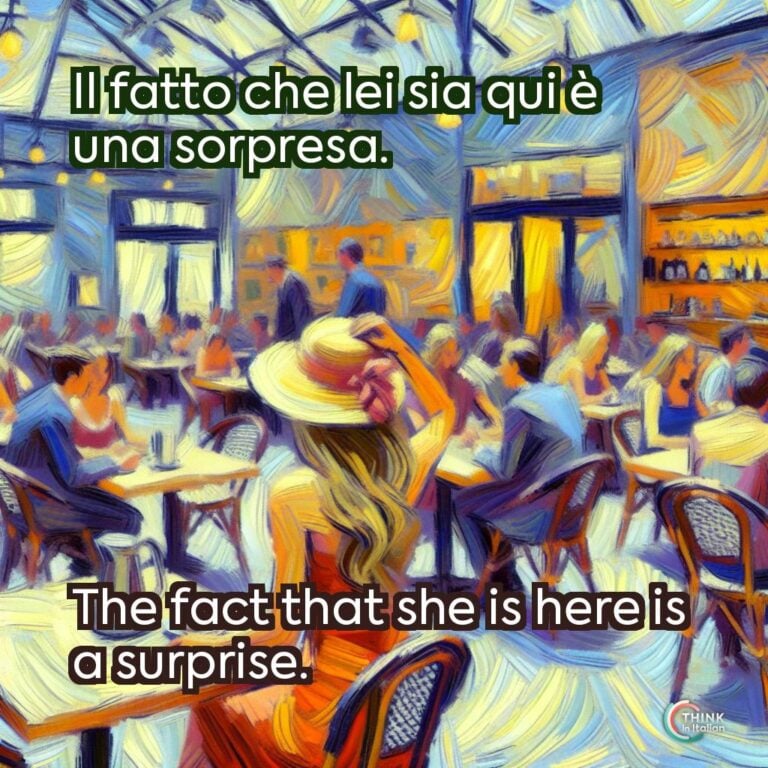“Il Fatto Che” in Italian
When I moved abroad I realized that il fatto che is an expression that I use a lot in Italian, because I constantly tried to translate it in all my conversations.
Whether I was introducing facts, justifying opinions, or explaining reasons, il fatto che is indeed incredibly versatile in Italian. However, it’s also one of those phrases that you need to use carefully, because it can have different nuances depending on the context.
As simple as it is, il fatto che translates to “the fact that” in English. It introduces a fact or a situation you want to emphasize
Il fatto che tu parli italiano mi sorprende.
The fact that you speak Italian surprises me.
What Does “Fatto” Mean in Italian?
Before diving into the more complex usage of il fatto che, let me spend some time on the word fatto itself. Fatto is the past participle of the verb fare (to do, to make) but it is also a noun, that translates to “fact”.
In the expression il fatto che, fatto is indeed used as a noun, referring to a piece of information, an event, or something that is true.
È un fatto importante.
It is an important fact.
Questo è un fatto ben noto.
This is a well-known fact.
A closely related expression is dato di fatto. It translates to “given fact” and is used to refer to something universally recognized as true, something that is beyond debate or question.
Dato di fatto is made up of two key words:
- Dato: past participle of verb dare (to give)
- Fatto
However, notice that, while dato di fatto and il fatto che both deal with facts, they are used differently.
How to use “Il Fatto che” in Italian
“Il Fatto Che” + Congiuntivo
One of the more challenging aspects of il fatto che is that it often requires the use of the subjunctive mood in Italian. The subjunctive is typically used when there is doubt, uncertainty, or subjectivity.
Therefore, when this expression introduces a statement that is subjective or not entirely certain, the verb that follows will often need to be in the subjunctive, as in the following examples:
Il fatto che lui non sia qui è strano.
The fact that he is not here is strange.
Il fatto che tu non capisca mi preoccupa.
The fact that you don’t understand worries me.
Here, the verbs following il fatto che are in the present subjunctive because the entire phrase is in the present tense. What I mean is that the entire statement introduced by il fatto che must be treated as the subject of the sentence.
The consequence is that the verb that agrees with the subject is conjugated in all verb tenses one might need, which play a role on the conjugation of the subjunctive mood within the expression.
Il fatto che lui sia venuto è una sorpresa.
The fact that he came is a surprise.
Il fatto che tu abbia detto la verità mi ha stupito.
The fact that you told the truth surprised me.
In these sentences, the past subjunctive is used because the actions expressed by sia venuto (came) and abbia detto (told) have been completed in the past, but they are still relevant or connected to the present situation.
Il fatto che lui non venisse mi preoccupava.
The fact that he wasn’t coming worried me.
Mi è piaciuto il fatto che loro rispondessero a tutte le domande.
I liked the fact that they were answering all the questions.
Here, the imperfect subjunctive is used because the main verb is in a past tense, either such as imperfect or passato prossimo, and the two actions were occurring simultaneously in the past.
What I mean is that both, someone not coming and me being worried, were two simultaneous event somewhere in the past, therefore I was worrying while he was not coming and now, in the present, I am expressing this thought.
Il fatto che lui fosse già andato via mi ha deluso.
The fact that he had already left disappointed me.
Il fatto che noi avessimo finito il progetto prima del previsto è stato sorprendente.
The fact that we had finished the project earlier than expected was surprising.
Finally, the past perfect subjunctive is used when the main clause is in the past, and the action following il fatto che occurred even earlier.
Here, fosse andato and avessimo finito are in the pluperfect subjunctive, showing that the action happened earlier in the past and carries subjective or emotional weight.
“Il Fatto Che” + Indicativo
If this explanation sucked all your energy out of you, I am sorry! But no worries, here things are easier: il fatto che can also be followed by the indicative mood, specifically when you are expressing something factual, objective, or certain.
Il fatto che lui è arrivato tardi non cambia niente.
The fact that he arrived late doesn’t change anything.
Here, the fact that someone arrived late is a concrete, objective fact. Since there is no subjectivity or doubt involved, the indicative form of the verb is used.
State Facts in Italian
Understanding il fatto che is key to speaking more fluently in Italian. Whether you’re introducing a fact, justifying an argument, or explaining a cause, this phrase gives you the flexibility to express your thoughts clearly and emphatically.
Make sure you know when to use the subjunctive or indicative, and add depth and precision to your Italian conversations. With practice, this expression will become a natural part of your Italian vocabulary, helping you express yourself more effectively in any situation.






